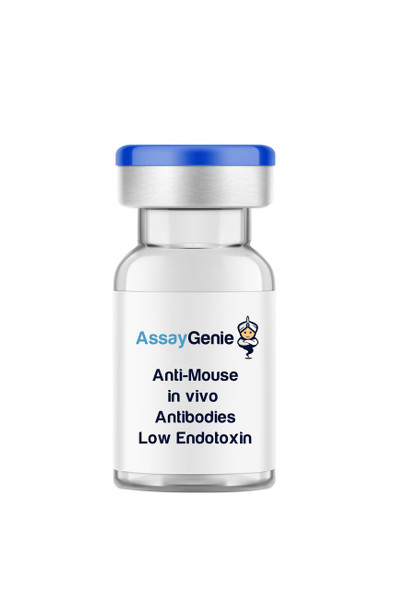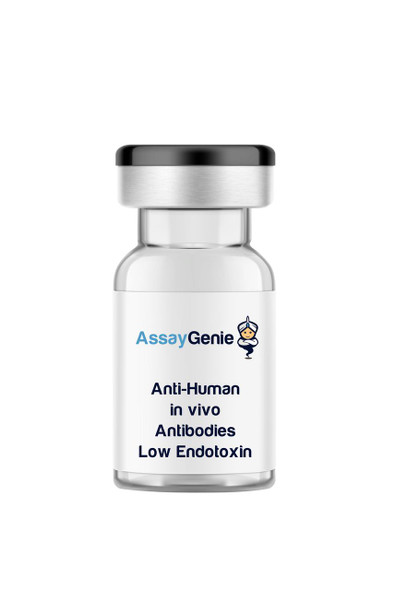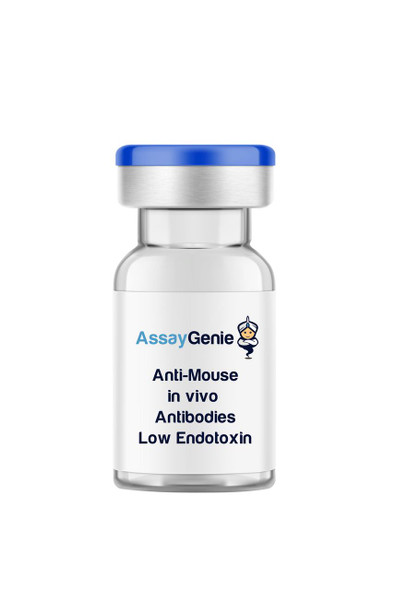Anti-Mouse CD90 (Thy-1) [HK2.1] In Vivo Antibody - Low Endotoxin
- SKU:
- IVMB0160
- Product Type:
- In Vivo Monoclonal Antibody
- Clone:
- HK2.1
- Protein:
- CD90
- Isotype:
- Rat IgG2c
- Reactivity:
- Mouse
- Synonyms:
- Thy-1
- CD90
- CDw90
- Research Area:
- T Cell Depletion
- Endotoxin Level:
- Low Endotoxin
- Host Species:
- Rat
- Applications:
- FA
- WB
Description
| Product Name: | Anti-Mouse CD90 (Thy-1) [HK2.1] In Vivo Antibody - Low Endotoxin |
| Product Code: | IVMB0160 |
| Size: | 1mg, 5mg, 25mg, 50mg, 100mg |
| Clone: | HK2.1 |
| Protein: | CD90 |
| Product Type: | Monoclonal Antibody |
| Synonyms: | Thy-1, CD90, CDw90 |
| Isotype: | Rat IgG2c |
| Reactivity: | Mouse |
| Applications: | FA, WB |
| Formulation: | This monoclonal antibody is aseptically packaged and formulated in 0.01 M phosphate buffered saline (150 mM NaCl) PBS pH 7.2 - 7.4 with no carrier protein, potassium, calcium or preservatives added. |
| Endotoxin Level: | < 1.0 EU/mg as determined by the LAL method |
| Purity: | ≥95% monomer by analytical SEC >95% by SDS Page |
| Preparation: | Functional grade preclinical antibodies are manufactured in an animal free facility using only In vitro protein free cell culture techniques and are purified by a multi-step process including the use of protein A or G to assure extremely low levels of endotoxins, leachable protein A or aggregates. |
| Storage and Handling: | Functional grade preclinical antibodies may be stored sterile as received at 2-8°C for up to one month. For longer term storage, aseptically aliquot in working volumes without diluting and store at -80°C. Avoid Repeated Freeze Thaw Cycles. |
| Applications: | FA, WB |
| Reactivity: | Mouse |
| Host Species: | Rat |
| Specificity: | Clone HK2.1 recognizes a non-polymorphic determinant on mouse CD90 (Thy1.1 and Thy1.2 alloantigens). |
| Antigen Distribution: | CD90 is expressed by thymocytes, peripheral T cells, myoblasts, epidermal cells, and keratinocytes. |
| Concentration: | ≥ 5.0 mg/ml |
| Endotoxin Level: | < 1.0 EU/mg as determined by the LAL method |
| Purity: | ≥95% monomer by analytical SEC >95% by SDS Page |
| Formulation: | This monoclonal antibody is aseptically packaged and formulated in 0.01 M phosphate buffered saline (150 mM NaCl) PBS pH 7.2 - 7.4 with no carrier protein, potassium, calcium or preservatives added. |
| Preparation: | Functional grade preclinical antibodies are manufactured in an animal free facility using only In vitro protein free cell culture techniques and are purified by a multi-step process including the use of protein A or G to assure extremely low levels of endotoxins, leachable protein A or aggregates. |
| Storage and Handling: | Functional grade preclinical antibodies may be stored sterile as received at 2-8°C for up to one month. For longer term storage, aseptically aliquot in working volumes without diluting and store at -80°C. Avoid Repeated Freeze Thaw Cycles. |
CD90 is a 28-30 kD GPI-linked membrane glycoprotein and is part of the Ig superfamily. It interacts with CD45 in signal transduction. CD90 mediates adhesion of thymocytes to thymic stroma. It has been reported that CD90 binds with β2 and β3 integrins and is involved in the inhibition of hematopoietic stem cells proliferation and differentiation, as well as the regulation of cell adhesion and neurite outgrowth. It can be used as a marker for various stem cells, such as hematopoietic stem cells, and for the axonal processes of mature neurons. For use in FACS, CD90 is a popular surface marker for stem cells in combination with other markers such as CD34. There are two alleles for CD90 in mice that differ by one amino acid. The difference being that CD90.1 (Thy1.1) has an arginine and CD90.2 (Thy1.2) has a glutamine at position 108. CD90.2 is more prevalent and is expressed in most mice strains. CD90.1 is only expressed by a select few mice strains including AKR/J and PL strains. CD90.2 is a 25-35 kD GPI-anchored membrane glycoprotein. Like CD90, it is also in the Ig superfamily, interacts with CD45, and has involvement in signal transduction. The function of CD90.2 is thought to play roles in cognition, axon growth, T lymphocyte function, and apoptosis. CD90 acts as tumor suppressor for some tumors due to its action in upregulating thrombospondin, SPARC (osteonectin), and fibronectin. On the other hand, it has been suspected to aid in the spread of circulating melanoma cells. Regarding prostate cancer, CD90 has therapeutic potential for specific drug targeting due to its expression in cancer associated stroma, but not in normal stroma.
| Technical Datasheet: | View |
| Protein: | CD90 |
| Ligand/Receptor: | CD45 |
| Research Area: | Immunology, Stem Cell |

![Anti-Mouse CD90 (Thy-1) [HK2.1] In Vivo Antibody - Low Endotoxin Anti-Mouse CD90 (Thy-1) [HK2.1] In Vivo Antibody - Low Endotoxin](https://cdn11.bigcommerce.com/s-39x6lpnvxv/images/stencil/608x608/products/119908/118091/anti-mouse-cd90-thy-1-hk2.1-in-vivo-antibody-low-endotoxin__60452__35752.1698937769.jpg?c=1)
![Anti-Mouse CD90 (Thy-1) [HK2.1] In Vivo Antibody - Ultra Low Endotoxin Anti-Mouse CD90 (Thy-1) [HK2.1] In Vivo Antibody - Ultra Low Endotoxin](https://cdn11.bigcommerce.com/s-39x6lpnvxv/images/stencil/590x590/products/119907/118090/anti-mouse-cd90-thy-1-hk2.1-in-vivo-antibody-ultra-low-endotoxin__91809__42042.1698937769.jpg?c=1)
![Anti-Mouse CD90 (Thy-1) [T24/31] In Vivo Antibody - Low Endotoxin Anti-Mouse CD90 (Thy-1) [T24/31] In Vivo Antibody - Low Endotoxin](https://cdn11.bigcommerce.com/s-39x6lpnvxv/images/stencil/590x590/products/119909/118092/anti-mouse-cd90-thy-1-t2431-in-vivo-antibody-low-endotoxin__09572__05263.1698937771.jpg?c=1)
![Anti-Mouse CD90 (Thy-1) [T24/31] In Vivo Antibody - Ultra Low Endotoxin Anti-Mouse CD90 (Thy-1) [T24/31] In Vivo Antibody - Ultra Low Endotoxin](https://cdn11.bigcommerce.com/s-39x6lpnvxv/images/stencil/590x590/products/119906/118089/anti-mouse-cd90-thy-1-t2431-in-vivo-antibody-ultra-low-endotoxin__95969__64294.1698937768.jpg?c=1)


![Anti-Mouse/Rat CD90.1 (Thy-1.1) [OX-7] In Vivo Antibody - Low Endotoxin Anti-Mouse/Rat CD90.1 (Thy-1.1) [OX-7] In Vivo Antibody - Low Endotoxin](https://cdn11.bigcommerce.com/s-39x6lpnvxv/images/stencil/590x590/products/120029/118212/anti-mouserat-cd90.1-thy-1.1-ox-7-in-vivo-antibody-low-endotoxin__67252__33254.1698937827.jpg?c=1)


